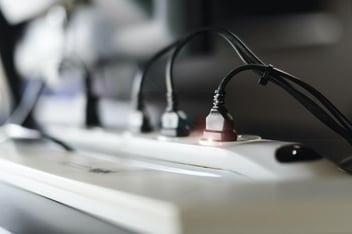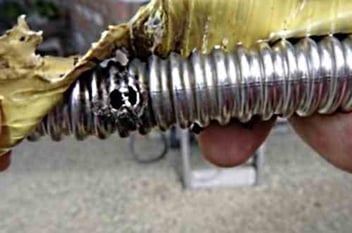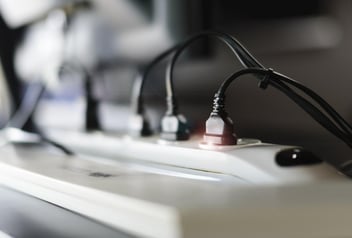We asked our electrical safety officer, Bill Hicks, to meet up with Kelowna’s Burn Fund Rep, Rob Baumann to answer some common questions about how to prevent electrical fires in the home.
Approved power bars and extension cords
Q: Why should I buy one of those expensive power bars when I can get a pretty cheap one at the dollar store?
A: The most important thing to consider when buying a power bar isn’t price, but whether it’s approved for use in Canada or not. Using a power bar that’s unapproved for use in Canada is a safety hazard, and may be an electrical fire risk.
Overloading power bars
Q: Is it possible to overload an approved power bar?
A: The short answer is yes. A couple of years ago, we had an electrical fire incident in Kelowna that resulted in a fatality. The cause was an electrical fire that was started because the power bar was overloaded beyond what it could safely support.
Power bars are a great way to maximize outlets and minimize the impact of power surges, but it’s important to know that most 120-volt power bars are rated at a maximum load of 12 amps. Just a few appliances plugged into a power bar can easily exceed its maximum load. Say you plugged in a 1,300-watt toaster and a 1,100-watt coffee maker into the same power bar. Already you’re at a combined load of 20 amps—almost double what your power bar can handle. The risk here is serious—an overloaded power bar could potentially overheat and cause an electrical fire.
Q: What are some ways I can avoid overloading my power bar, and how can I tell if I might be overloading it by accident?
A: Many products come with installation instructions that explain whether you can or cannot plug them into a power bar or extension cord. Some common products that can never be plugged into power bars or extension cords are energy-sensitive items like portable heaters, air conditioners, fridges, hotplates, etc. These kinds of items can overheat the circuit and can potentially cause an electrical fire.
To tell if a power bar might be overloaded, check for signs of overheating, such as scorch marks or the device being warm to the touch. If you see scorch marks, or the device feels warm to the touch, unplug your items immediately. If you are uncertain please contact a licensed electrical contractor to determine why this is happening.
Q: My breaker keeps tripping when I plug a household item into my power bar. It’s the only thing plugged into the power bar and I don’t think I’m overloading it, so why is this happening?
A: Over-current devices (breakers and fuses) are there to protect the circuit in the event they become overloaded. If a breaker is tripping or a fuse is blowing, it’s doing its job. This means there’s something wrong in the circuit, so don’t continue to reset or replace it as this is an electrical fire hazard.
Aluminum wiring safety
Q: I’m concerned about the aluminum wiring in my house. I have some copper-only devices and heard that if I used copper-only devices on aluminum wiring, it could start a fire. What should I do?
A: It’s true that there’s a risk of electrical fire if you use a copper-only device on aluminum wiring. If you want to have the devices replaced, ensure that the proper connectors, wiring methods and devices are used. If you want to have the aluminum wiring replaced, it should be done by a qualified individual under an electrical installation permit.




